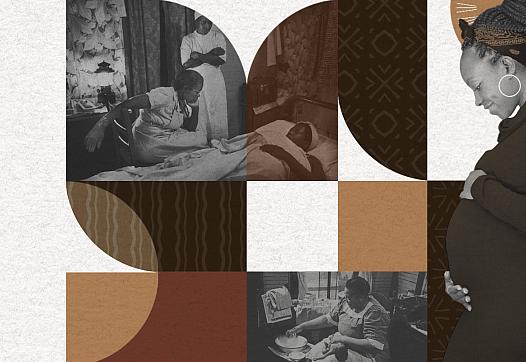Know Who’s Treating You
This story was originally published in Black Voice News with support from the 2022 California Fellowship.
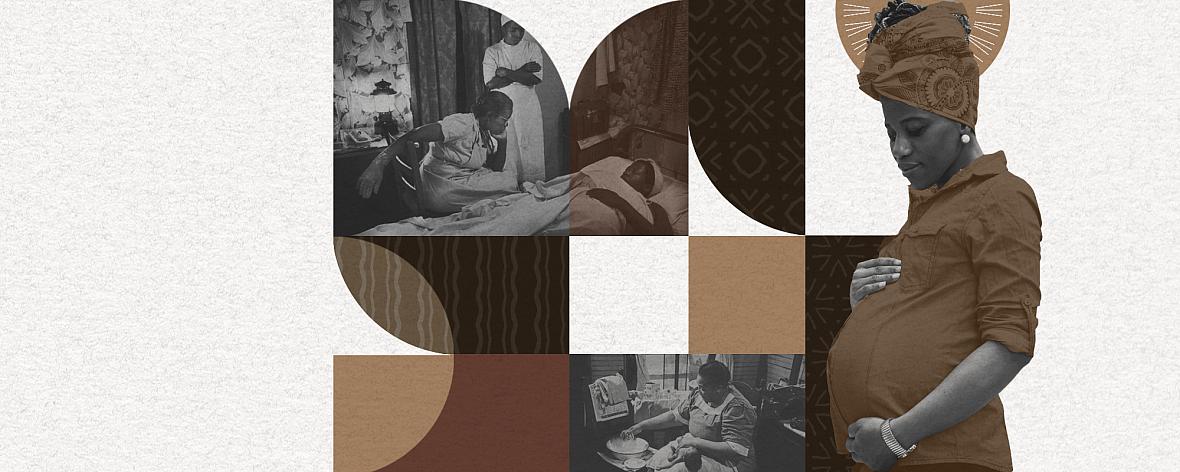
Black Voice News
Tonja Bey didn’t set out to become a doula. Nearly 30 years ago, Bey accompanied her sister to the hospital when she was due to give birth. Bey observed a nurse telling a young lady in the bed beside them to “shut up” while the patient screamed in pain. Bey turned to the nurse and put a stop to her behavior.
“I just thought that was just so disrespectful,” Bey said. She recalled asking the nurse if she had any children, to which the nurse responded no. “So, you have no idea what she’s going through,” Bey said to the nurse.
The more Bey joined her nieces and friends during their labor and deliveries, the more she observed instances of mistreatment, whether it was hospital staff pressuring them to have cesarean sections or ignoring complaints of pain. Bey said helping others during labor came naturally to her, and she eventually decided to get trained as a doula. She is now a certified doula, lactation specialist and postpartum doula.
Bey is a mother of 10 and advocates for births with little to no medical intervention. She encourages her clients to speak up and not be submissive when it comes to questioning doctors, a trait she believes has been passed down from previous generations. Bey described herself as not being dismissable and motivates her clients to be the same.
“You have to know who’s treating you,” Bey explained. “And if you’re not comfortable with what they’re saying, say something, speak up for yourself. I guess I’m kind of an advocate as well, because they hate to see me come.”
Bey serves everyone in the community, but she is focused on providing services to Black, Indigenous and people of color. She leaves her business cards at clinics and Special Supplemental Nutrition Program for Women, Infants and Children (WIC) offices throughout the Inland Empire. She welcomes a lot of clients through leaving her card, she said, many of whom are curious and surprised about what a doula is.
“They’ll ask, ‘What is a doula?’ Because we didn’t hear about that,” Bey said. “We are the midwives from our grandparents and great grandparents.” Bey has heard some people say they don’t want a midwife, but “midwives and doulas work together.”
Sykes described the difference between midwives and doulas as midwives being legally authorized to “catch the baby.”
“It is a viable work, it’s not a new thing. Now, the term doula may be new to our sector, but honestly, Black women have been doing this work for a long, long time,” Sykes said. “It’s not new. Many, in the past, hundreds of years ago, were midwives.”
Midwifery was largely criminalized in the U.S. in the 20th century by male gynecologists like Joseph DeLee despite midwifery being the only accessible care for Black, migrant and poor women during that time. Similarly, doula work has been trivialized by physicians. Male gynecologists asserted that the practice delivered subpar care, lacked professionalism and was the cause of fatal maternal and infant outcomes.
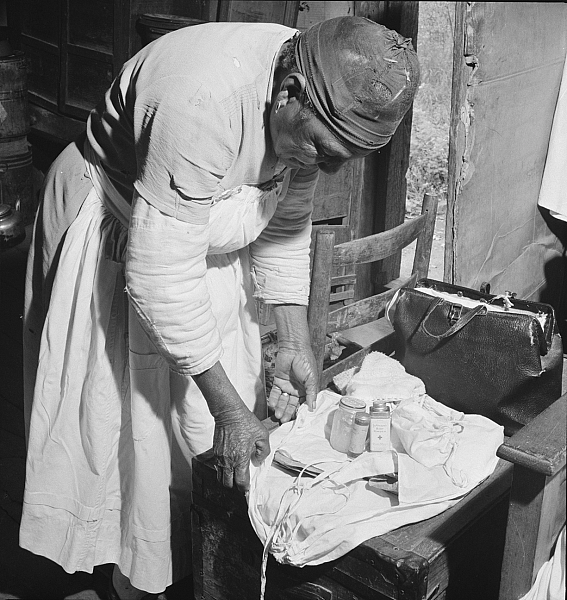
Midwife wrapping her kit to go on a call in Greene County, Georgia in the 20th century (Courtesy of Library of Congress/ Jack Delano).
As an example of such criminalization, the practice of midwifery required a license in 1917 under the California Medical Practices Act (AB 1375), but restricted midwives from practicing any medical duties. The practice was essentially eliminated in 1949 when the Board of Medical Examiners lost the authority to issue certifications and the standards for obtaining a certificate were repealed. Both of these actions made obtaining a “valid” certificate nearly impossible.
Two decades later, in 1974, the Nurse Practice Act became law allowing nurse midwives, considered advanced practice registered nurses, to practice under the supervision of a licensed physician and surgeon. Today, it is not uncommon for birthing people to have both a nurse midwife, or a licensed midwife — who are able to practice without physician supervision — and a doula present during labor.
Doulas work in concert with midwives, doctors and nursing staff to assure that the birthing person’s needs are being addressed. Sykes explained that no matter what, a doula’s role is to support the birthing individual.
“But we also become extra hands, eyes and person for the nursing staff. Every facility that I’ve been to, the nurses have been just wonderful,” Sykes explained. “They appreciate the extra help because I realized they’re spread thin, too, in many cases, and they cannot give mom the attention she needs.”
Creating space within the healthcare system
Rhonda Smith, the Executive Director of the California Black Health Network (CBHN), explained that in order to achieve equitable care in the healthcare system, especially for Black women and people, there needs to be a change in the way healthcare is delivered across the board.
“I think the system and the culture has to change in order for us to see change in terms of the impact on individual health and outcomes. I think that in addition to the training, there needs to be some accountability,” Smith said.
When it comes to Black maternal mortality, Smith stated that the disproportionate impact on Black birthing people and fatal outcomes are “driven by racism.”
“I think it’s beyond implicit bias, but if you want to call it that, fine,” Smith asserted. “To me, it’s still racism, whether people are aware of it or not.”
As executive director of CBHN, Smith has led advocacy efforts for maternal health bills such as the expansion of medical coverage of doulas and the California Dignity in Pregnancy and Childbirth Act (SB 464). Smith also explained that part of the solution to achieving equitable care and overcoming racism in the healthcare system will be to create more of a workforce of Black doulas, an initiative she said CBHN would co-sponsor.
“There are systems that can be created. I think that is the most ideal thing — that it doesn’t get put on one community or one state or one part of our health care system, but all of it is like standard,” explained Dr. Sayida Peprah-Wilsom, co-founder of nonprofit Diversity Uplifts and member of the Sankofa Birthworker’s Collective.
“Which would mean that the insurance companies, private insurance, would also see doula support as an essential part of the maternal system and maternal care.”
A ceremonial experience
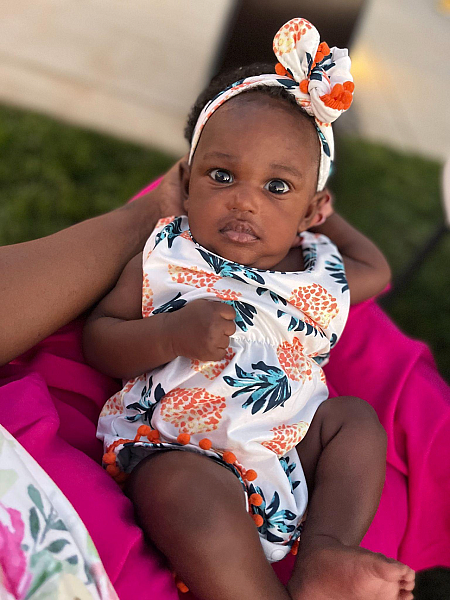
Noni, DeShawna Wright’s daughter, looks at the camera as Wright holds her (Image courtesy of DeShawna Wright).
DeShawna “Shay” Wright described having a doula as like having a therapist who is concerned with the birthing person and the child’s wellbeing. Wright acknowledged that doulas are not doctors, but explained that they are very knowledgeable about labor and birthing processes.
After Wright delivered her baby, her doula Chantel Runnels, came to her house to perform a binding ceremony. Following the birth of the baby, the hospital gave Wright a postpartum girdle to help her uterus contract and return to normal size. Runnels binded Wright using a lightweight mesh material and performed breathing exercises with her to set a soothing and relaxing environment. Wright described the experience as ceremonial.
During Wright’s postpartum period, she was exhausted and had moments of anxiety, but Runnels checked in with her and made sure she ate, got rest and took care of basic needs.
“In my opinion, a doula is someone I think that every mother should consider when having a baby because there are things they know about the process your body is going through when you’re laboring that you don’t know,” Wright said.
Doula pilot programs to address racial health disparities have operated across California counties for a few years. Between October to November 2021, the National Health Law Program (NHeLP) gathered information, conducted interviews, surveyed stakeholders and analyzed ten pilot programs as part of their Doula Medicaid Project. Four of the pilot programs are in Riverside and San Bernardino Counties, which include the Inland Empire Health Plan/ Riverside Community Health Foundation’s Doula Access Program and the Sankofa Birthworker’s Collective.
A summary of the doula pilot programs conducted by the NHeLP asked, “What are the top 2-3 things you are most proud of accomplishing with this doula pilot?”
Listen as DeShawna Wright describes her relationship with her doula.
“…I am most proud that we are finally able to make doula care an accessible service to pregnant African American moms who have some of the highest rates of birth disparities. I am glad we are ensuring that doulas are no longer considered an ‘elite’ service that only certain populations can access,” was the response from the Sankofa Birthworker’s Collective.
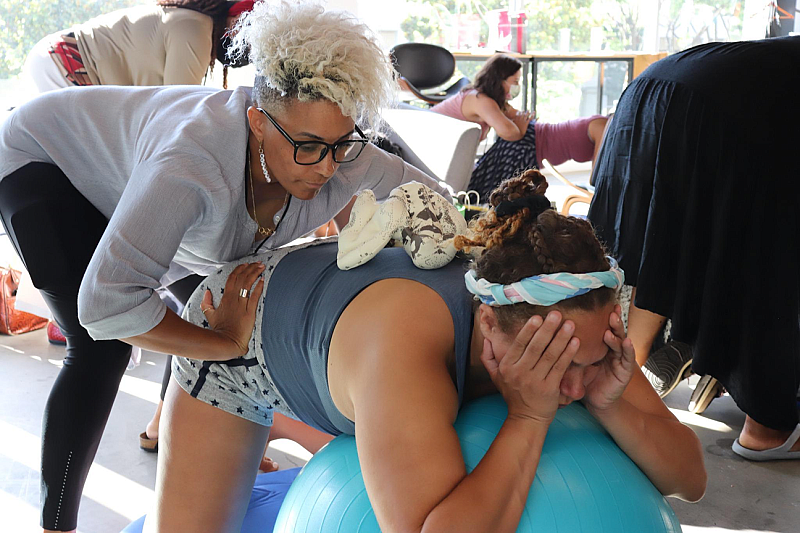
Chantel Runnels participates during a Black Community Doula Training hosted by the Riverside Community Health Foundation (RCHF) as part of the Doula Access Program in July 2022 (Image courtesy of RCHF).
Prior to applying for a doula through the Doula Access Program in Riverside County, Wright sought a doula through a friend of hers who was familiar with a doula in Los Angeles. The proposed cost for her services for one month, prenatal, was $1,800. Wright and her husband had just purchased a home and couldn’t afford that price.
Private doulas services are often expensive due to the amount of support, labor and time doulas spend with birthing clients and their families. With pilot programs like the Doula Access Program and the Sankofa Birthworker’s Collective, Black birthing people like Wright are able to access doula services at no cost.
“I don’t think people just realize, like, every single day a baby is born. And that impacts the community. Every part of our society is connected to healthy children being born, healthy moms giving birth and both people coming home healthy, safe and sound — that impacts the entire community, [it] has ripple effects,” Runnels said.


